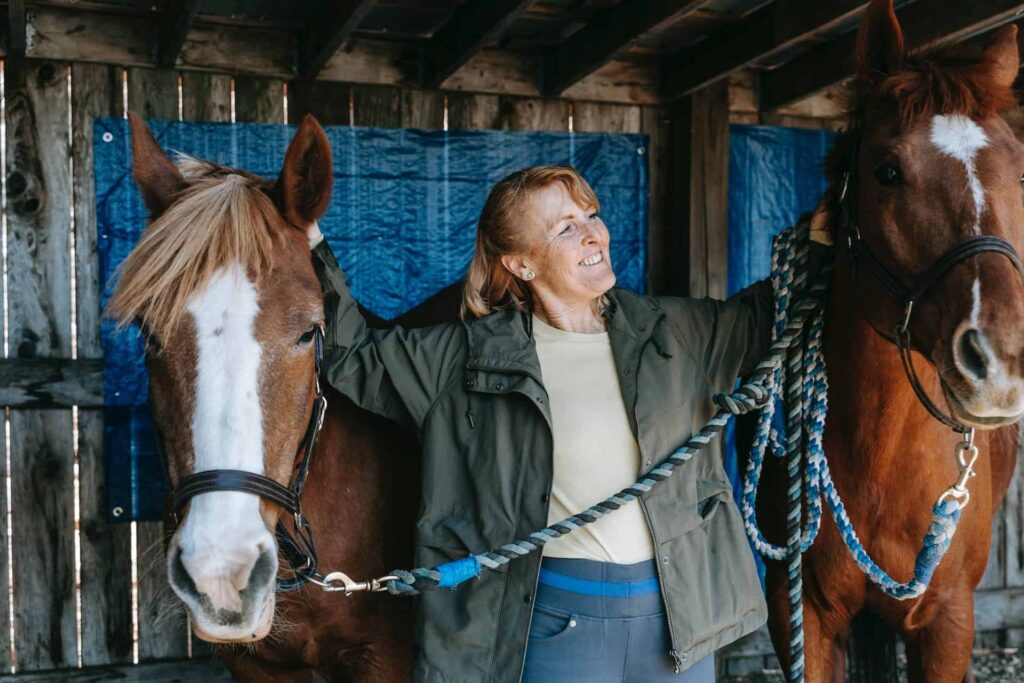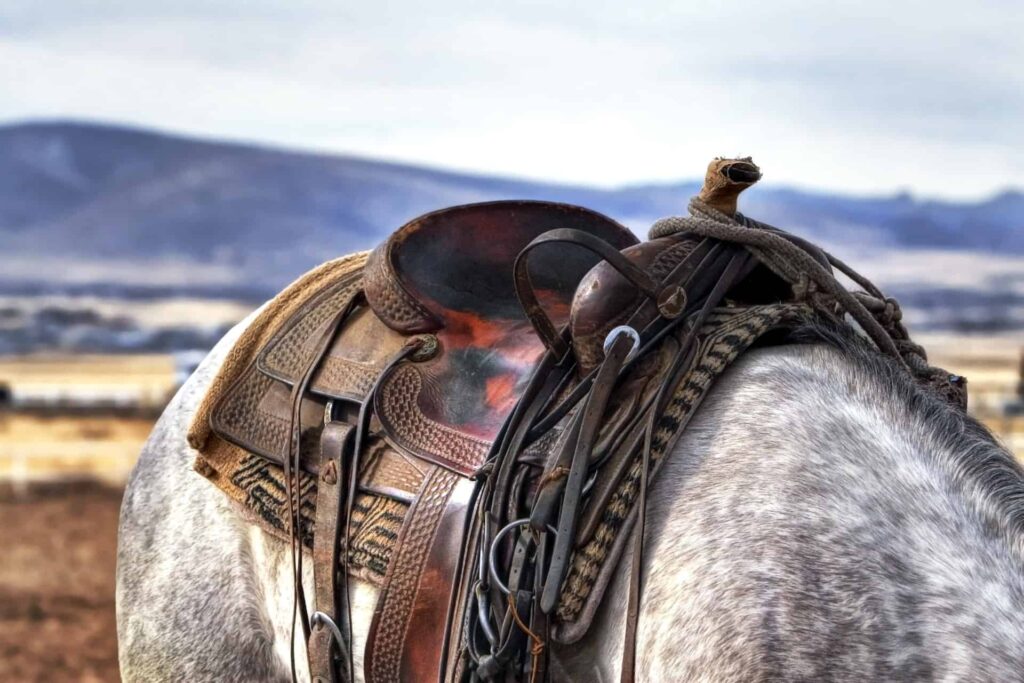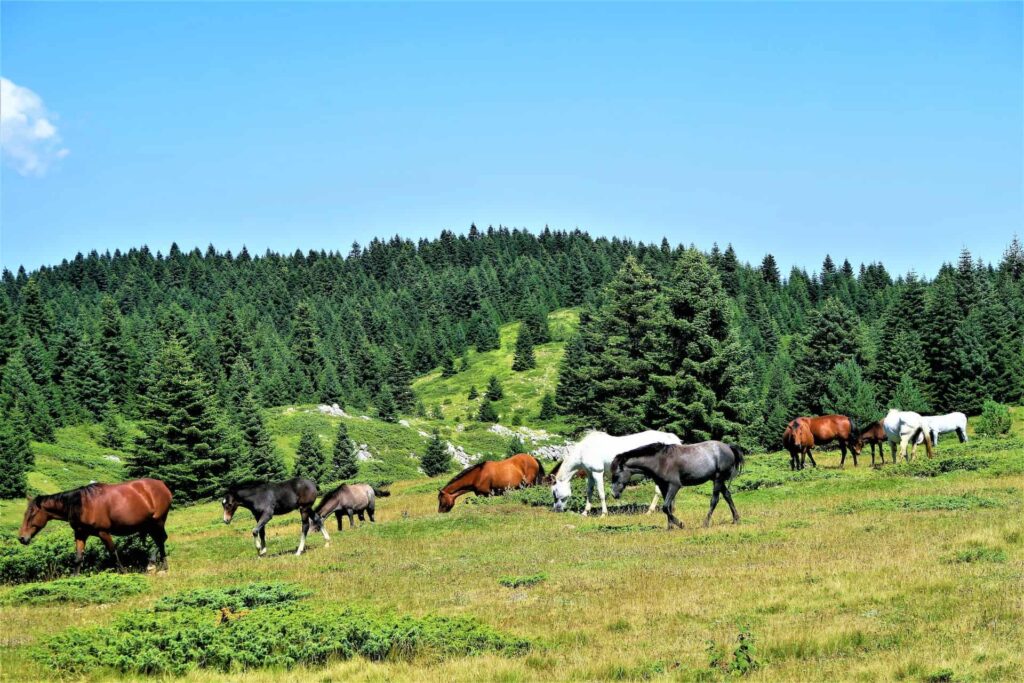Horses have long captivated the human imagination with their grace, strength, and beauty. As majestic animals and steadfast companions, understanding how long do horses live can help us better care for them and appreciate the time we share. A horse’s life expectancy varies depending on breed, genetics, and environmental conditions. On average, a domesticated horse can live between 25 to 30 years, although some horses have been known to live into their 40s with proper care and attention.
Understanding the factors that contribute to a horse’s lifespan helps ensure their health and well-being. Genetics plays a significant role, with certain breeds having longer life expectancies than others. Beyond genetics, nutrition, exercise, and overall care can greatly impact the length and quality of a horse’s life. Proper care and timely interventions for health issues are key to prolonging a horse’s life, as well as recognizing the signs of aging and adjusting their lifestyle accordingly.
Key Takeaways
- A horse’s lifespan depends on its genetics, nutrition, and overall care.
- Domesticated horses can live between 25 to 30 years, and sometimes into their 40s with proper care.
- Recognizing signs of aging and addressing health concerns can help prolong a horse’s life.
Understanding Horse Lifespan
Horses are known for their strength, beauty, and connection with humans throughout history. One important aspect of a horse’s life is its lifespan, which can significantly vary depending on genetics, breed, environment, and care provided to the animal.
The average lifespan of a healthy, well-cared-for horse is between 25 to 30 years. However, it is not uncommon for some horses to live well into their 30s or even early 40s. Swedish warmblood and coldblood horses are examples of breeds that may have a longer lifespan.
Proper care plays a vital role in determining the longevity of a horse. This includes regular exercise, a balanced and nutritious diet, routine veterinary check-ups, and appropriate dental care. By maintaining a healthy lifestyle for the horse, its general quality of life and lifespan can be prolonged.
There is a direct correlation between the human-horse relationship and the aging process of horses. Our understanding of the equine aging process is still limited, but the emerging research on horse aging sheds new light on ways to potentially extend the human lifespan or enhance our quality of life.
The science of telomeres, which play a crucial role in cellular aging, is becoming increasingly relevant in understanding horse lifespan. Studying telomere regulation in horses may provide opportunities to gain further insights into aging in both horses and humans.
The average horse lives between 25 to 30 years, but some breeds and well-cared-for individuals can live much longer. Maintaining a healthy lifestyle and understanding advances in aging research can contribute to prolonging a horse’s life while enhancing their overall well-being.
Influence of Genetics and Breeding
Horse breeds and their genetic makeup play a significant role in determining the lifespan of a horse. Different breeds have distinct characteristics and life expectancies. Some well-known horse breeds include Quarter Horses, Arabians, and Friesian horses, each possessing unique genetic traits that contribute to their longevity.
Quarter Horses, one of the most popular breeds in the United States, are known for their speed and agility. They typically have a lifespan of 25 to 30 years. Their genetic traits make them versatile and resilient, leading to a longer and healthier life compared to other breeds.
Arabians are one of the oldest and most influential breeds, known for their endurance and strong immune system. These traits contribute to their ability to thrive in challenging environments and maintain a healthy life. Arabians generally have a life expectancy of 25 to 30 years, similar to that of Quarter Horses.
Friesian horses, originating from the Netherlands, are recognized for their stunning appearance and incredible power. They can also have lifespans of up to 25 years. However, Friesian horses tend to be more prone to specific health issues, such as aortic rupture and dwarfism, due to their genetic makeup. These health concerns may sometimes shorten their life expectancy.
Breeding practices also have an impact on a horse’s lifespan. Inbreeding, for example, can lead to harmful genetic traits being passed on, resulting in poor health and lower longevity. The effects of inbreeding on covering success, gestation length, and foal sex ratio in Australian thoroughbred horses highlight the importance of understanding how breeding practices and genomics influence the health of horses.
It’s crucial for those involved in horse breeding to select horses with favorable genetic characteristics to minimize the risk of hereditary health issues. This allows for better overall health and potentially longer lifespans in the bred horses. Responsible breeding practices can ensure the preservation of unique breed traits and help maintain genetic diversity within different horse populations.
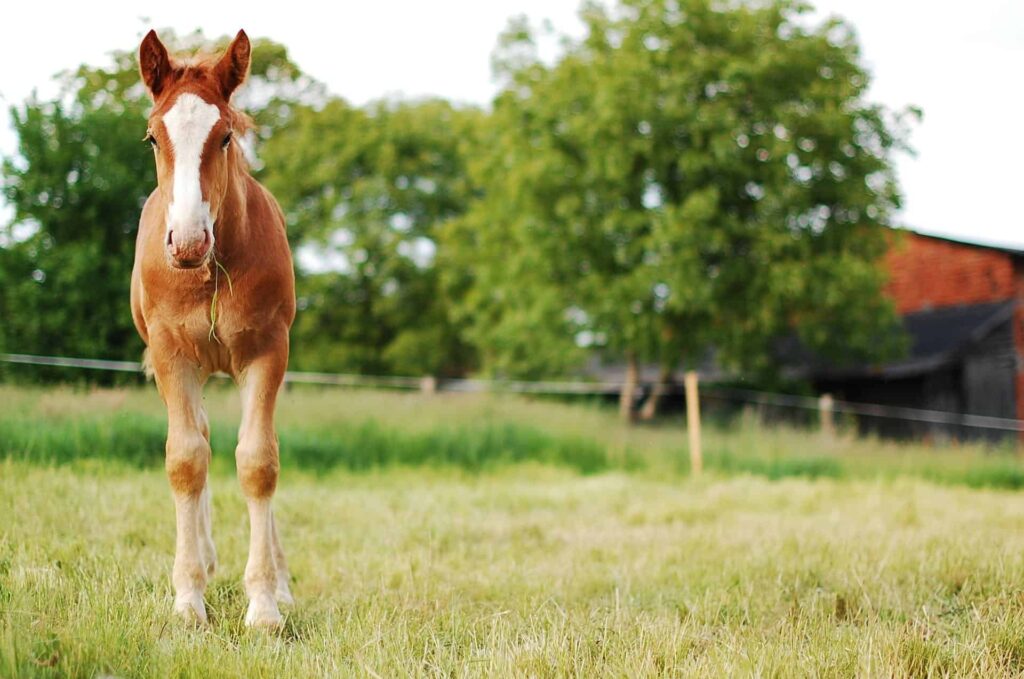
The Role of Nutrition and Exercise
Proper nutrition and regular exercise play vital roles in determining the overall health and lifespan of horses. By ensuring that horses receive a balanced diet and engage in physical activity, owners can promote their well-being and potentially extend their lives.
Nutrition is a crucial component of a horse’s health. A horse’s diet should primarily consist of forage, such as grasses and hay. Forage provides the essential nutrients, fiber, and energy needed to maintain optimal health. Horses require vitamins, minerals, and water to support their bodily functions.
Supplemental feeding may be needed, especially for horses with specific nutrient requirements, such as pregnant mares, growing foals, or performance horses. However, it is important to avoid overfeeding, as this can lead to obesity and related health issues.
Exercise is another key factor in maintaining a horse’s overall health and longevity. Regular physical activity helps to maintain a horse’s musculoskeletal system, improves circulation, and prevents various ailments associated with inactivity, such as colic and laminitis. Exercise can also improve a horse’s mental well-being by providing stimulation and social interaction.
For optimal health, horses should engage in various types of exercise, such as:
- Walking and trotting: These basic gaits help maintain the horse’s muscular and cardiovascular health.
- Galloping and cantering: Faster paces help to build muscle strength, endurance, and agility.
- Groundwork exercises: Activities such as lunging, long-lining, or in-hand work can help to develop a horse’s balance, flexibility, and obedience.
The amount and intensity of exercise will vary depending on factors such as age, breed, and individual horse’s condition. Therefore, it’s important to tailor each horse’s exercise routine to its specific needs.
Proper nutrition and regular exercise are integral to a horse’s overall health and wellbeing. Providing a balanced diet, including high-quality forage, and ensuring adequate physical activity will help to keep horses healthy and potentially extend their lifespan.
Specific Care for Domesticated Horses
Domesticated horses require various aspects of care to maintain their health and a longer lifespan. Horse owners need to pay appropriate attention to the key areas of hoof care, veterinary care, dental care, and deworming.
Hoof care is a crucial aspect of a horse’s overall health. Regular maintenance, such as trimming and routine check-ups by a professional farrier, helps prevent complications related to the hooves. Horse owners should also monitor their horses for signs of common hoof issues, such as thrush, abscesses, or laminitis.
Veterinary care is necessary for the well-being of domesticated horses. Regular visits to a veterinarian specializing in equine health can help identify and deal with any health concerns promptly. Horse owners must prioritize vaccinations, which prevent dangerous diseases such as equine influenza, tetanus, and strangles. Establishing a proper vaccination schedule in consultation with the veterinarian is crucial to protect the horse’s health.
Dental care is another important component of horse care. Regular dental check-ups and floating of teeth by a qualified equine dentist can help prevent dental issues and make sure the horse is able to chew food properly. Poor dental care can lead to malnutrition, weight loss, and other health issues over time.
Deworming is vital to protect horses from internal parasites that can cause digestive problems or colic. A well-planned deworming program, using the appropriate medication, will keep the horses healthy and comfortable. It is recommended to consult the veterinarian for guidance on deworming schedules and the best horse wormer products.
By keeping a close eye on these aspects of horse care, owners can contribute to the overall well-being of their domesticated horses, providing them with a healthy and comfortable life.
Health Concerns Affecting Lifespan
Horses, like any other living beings, can face various health concerns throughout their lives. These health issues can impact their overall lifespan, so it’s critical to address them promptly. Here are some of the critical health concerns affecting horses such as colic, injury, and soundness issues.
Colic is a significant threat to horses’ health, as it is one of the leading causes of death in adult equines. Colic refers to a group of gastrointestinal disorders that can cause severe pain and discomfort. It can be triggered by diet changes, inadequate water intake, and digestive problems. Proper management and timely veterinary care are crucial for treating colic and preventing complications.
Injury is another common concern that can affect equine health. Horses are prone to various injuries due to their active lifestyles, which may include fractures, sprains, strains, and cuts. While minor injuries can be treated with rest and proper care, severe ones may require veterinary intervention. In some cases, injuries can lead to long-term health issues, reducing the horse’s overall lifespan.
Soundness issues refer to conditions that prevent horses from performing their regular activities or duties without pain or discomfort. These problems can be either congenital or acquired, and they often affect the horse’s muscles, joints, and bones. Examples of soundness issues include arthritis, tendonitis, and navicular disease. Timely diagnosis and appropriate treatment help maintain the horse’s quality of life and extend its lifespan.
Proper equine health management is vital in addressing the aforementioned concerns. Horse owners should stay informed about common equine health problems, be proactive in asking health-related questions when needed, and maintain close contact with a veterinary professional specializing in equine medicine.
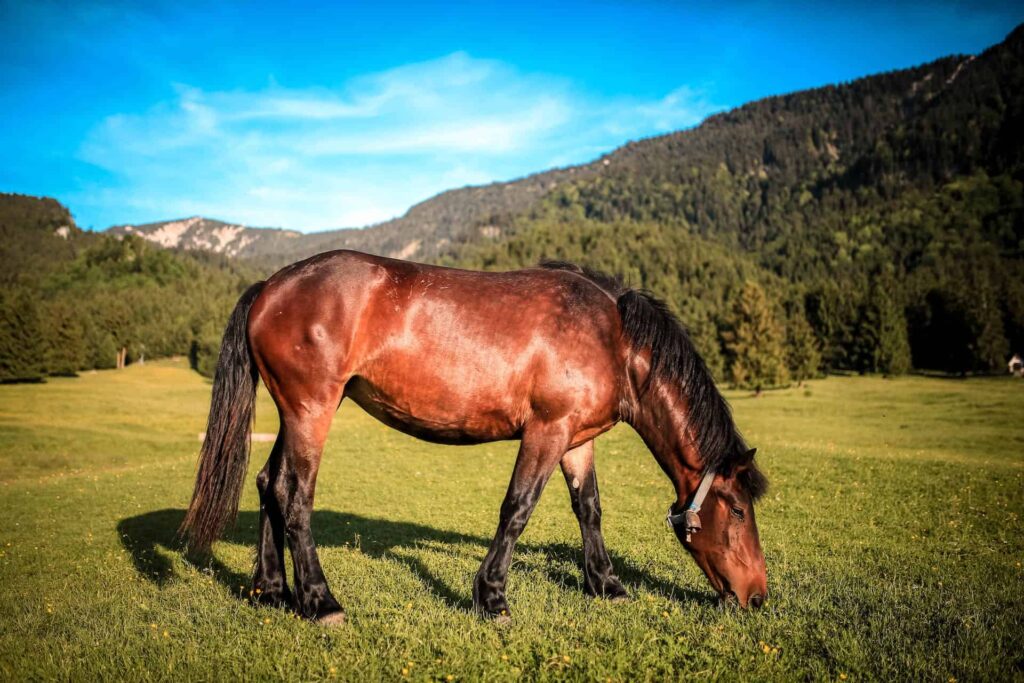
Different Life Expectancy Among Horse Breeds
There is a variation in life expectancy among different horse breeds. Some breeds, like ponies, are known for their hardiness and longevity, often living well into their 30s. On the other hand, larger breeds like draft horses tend to have a slightly shorter lifespan, typically around 20-25 years. Factors such as living conditions, nutrition, and veterinary care also greatly influence a horse’s life expectancy.
Mustangs are a breed of feral horses found in the United States. Being wild animals, their life expectancy is influenced by environmental factors and the availability of resources. However, they are hardy and adaptable creatures, which usually allows them to live up to 25-30 years when provided with proper care.
Miniature horses are smaller versions of the domestic horse, and their lifespan is comparable, ranging from 25 to 35 years on average. These small horses have similar health and care requirements as their larger counterparts and can enjoy a long life when well taken care of.
In contrast, draft horses are large, sturdy horses known for their strength and ability to perform heavy work. These breeds, including Clydesdales, Shires, and Belgians, typically have a life expectancy of around 20-25 years. Their size and workload may contribute to their shorter lifespan compared to other breeds.
Smaller breeds, such as the American Quarter Horse and Arabians, tend to live longer lives than larger breeds. These horses generally have a life expectancy of 25 to 30 years, with proper care, but individual lifespans may vary.
It is important to note that the life expectancy of a domestic horse greatly depends on the quality of care it receives. Horses that receive regular veterinary care, proper nutrition, and consistent exercise can often live longer, healthier lives regardless of their specific breed.
Aging and Signs of Aging in Horses
Domesticated horses generally live between 25 to 30 years, although some may live well into their 30s. In contrast, wild horses tend to have shorter lifespans due to harsher living conditions and limited access to resources like food and water. The aging process in horses, like in other animals, is influenced by genetics, nutrition, and overall health care.
Horse age can be broadly categorized into young horses and senior horses. Young horses are those under 10 years of age, while senior horses are those above 15 years. There are visible signs of aging in horses that owners and caretakers can observe, which can help them provide appropriate care and attention to their equine companions.
Some common signs of aging in horses include:
- Greying hair: A horse’s coat may begin to turn grey, particularly around the muzzle, eyes, and tail base.
- Loss of muscle mass: Horses may lose muscle tone and mass, especially along the topline and hindquarters.
- Joint stiffness and arthritis: Older horses may experience stiffness and soreness in their joints, and some may develop chronic arthritis.
- Dental issues: Senior horses often suffer from dental wear and problems, which can lead to difficulty chewing and weight loss.
Proper management of senior horses includes adjusting their nutrition and exercise routines, regular dental care, and maintaining an optimal living environment. Regular veterinary check-ups are crucial to monitor the health of aging horses, addressing any developing issues promptly.
Both young and senior horses exhibit distinct signs of aging, which require attentive care and management. By providing proper care, owners can help their horses maintain a good quality of life throughout their golden years.
Historical Long-lived Horses
Horses have a fascinating history and can live longer than many people assume. Their average lifespan ranges between 25 to 30 years, but some horses have been known to live much longer. Let’s explore a few historical long-lived horses.
One such exceptional equine was Old Billy, who is believed to have lived for 62 years. Old Billy, born in 1760, worked as a barge horse in England. His impressive longevity attracted attention, and people often marveled at his strength and stamina. The fact that he was able to keep working for such an extended period is a testament to the resilience some horses possess.
Another remarkable long-lived horse was Sugar Puff, who lived to be 56 years old. Sugar Puff was a Shetland-Exmoor cross pony, known for his power and gentle nature. Born in 1951, he held the Guinness World Record for being the oldest living pony until his death in 2007. Sugar Puff’s long life may be attributed to the exceptional care and attention he received from his owners.
Certain breeds of horses are known for their longevity. For example, the Lipizzaner breed is a slow-maturing, long-lived horse often performing well into their later years. The combination of careful breeding and attentive care contributes to their extended lifespans.
It’s evident that while the average horse’s life expectancy is around 25 to 30 years, some exceptional horses have lived much longer. The stories of Old Billy and Sugar Puff stand as inspiring examples of the potential longevity these animals can achieve. With proper care, nutrition, and attention, horses can lead long and productive lives.
Horse-Human Age Comparison
Horses, being a considerably different species from humans, have a unique aging process. While it is common knowledge that horses generally have a shorter lifespan than humans, it is interesting to compare their aging processes.
On average, a horse lives for 25 to 30 years. However, breed, health, and care can influence the length of a horse’s life. In comparison, human life expectancy ranges from 70 to 90 years depending on genetics, lifestyle, and environment.
To further illustrate the differences between horse and human aging, we can approximate the horse-human age conversion. For example, a one-year-old horse is roughly equivalent to a six-year-old human child. At two years old, a horse would be considered a teenager in human years, around 13 years old. By the time a horse reaches four years of age, they are comparable to a 20-year-old human.
Comparing the middle-aged stage of horses and humans, a 15-year-old horse is similar to a 45-year-old human. As horses reach their senior years, their aging process slows down. For instance, a 20-year-old horse is equivalent to a 60-year-old human, and a 25-year-old horse is comparable to a 75-year-old human.
It is important to note that these age comparisons are not exact and can vary depending on factors like the ones mentioned earlier. A horse’s physical and mental health should also be taken into account when evaluating their age in human years.
Understanding the horse-human age comparison can help provide insight into the care and management required by a horse at different stages of their lives. Just as humans have specific needs as they age, horses too require tailored attention.
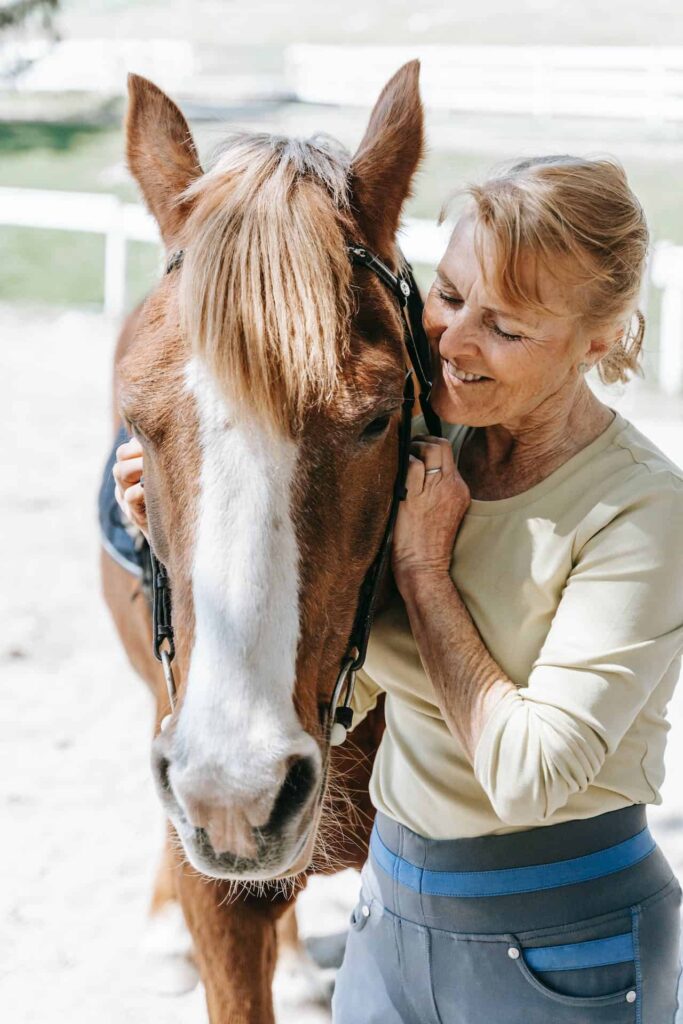
Social and Environmental Factors
Horses (Equus caballus) are social animals that thrive in groups, and their overall health and longevity can be influenced by various social and environmental factors. In the wild, horses live in stable, non-territorial reproductive groups. These groups consist of a dominant stallion, mares, and their offspring. Domesticated horses can be housed in group settings that attempt to mimic their natural social structures, providing them with opportunities for interaction and hierarchical organization.
Living conditions are crucial to horse health and well-being, and proper care should be taken to ensure that there is enough space as well as access to ample grazing. Restricted living conditions can cause stress in horses, affecting their temperament and personality traits. Horses can suffer from separation anxiety if they are unable to interact with their companions. A healthy social environment aids in maintaining the mental health of these animals.
Managing the health and well-being of stallions, mares, and geldings requires not only attention to their social needs but also to their physical health. Proper nutrition, regular exercise, and veterinary care are all key in horse care. In particular, nutrition is a critical aspect, as the feed that is provided should be balanced and suitable for the specific age, size, and workload of each horse.
Stress can significantly impact the long-term health of a horse. Studies have shown that hair cortisol levels, a marker of long-term stress, can indicate if horses are living well in their given conditions. Monitoring stress levels and providing an environment that fosters social interaction and reduces stressors can help improve a horse’s health and contribute to a longer life.
The social and environmental factors that impact a horse’s longevity are diverse, and understanding their specific needs and providing proper care promotes a healthier, longer life for these remarkable animals.
Read More: Horse Basics
Frequently Asked Questions
What is the average lifespan of a horse?
The average lifespan of a horse varies depending on its breed, lifestyle, and care. Generally, horses live to be in their 20s to 30s, with some reaching their 40s.
Do different breeds of horses have varying lifespans?
Yes, different breeds of horses can have varying lifespans. For example, smaller breeds like ponies and Arabians tend to live longer than larger breeds such as Thoroughbreds and draft horses. Nevertheless, care and environment play a significant role in determining each horse’s lifespan.
How does a horse’s lifestyle impact its lifespan?
A horse’s lifestyle is crucial in determining its lifespan; a well-cared-for horse will likely live longer than one in poor conditions. Factors impacting a horse’s lifestyle include diet, exercise, healthcare, and living conditions. Providing a balanced diet, regular veterinary care, proper exercise, and a clean, safe environment can contribute positively to a horse’s longevity.
What can influence a horse’s longevity?
Horse longevity can be influenced by genetics, nutrition, medical care, exercise, and the environment. Adequate care and management of chronic illnesses, injuries, and age-related issues, contribute to a horse’s longevity. Proper dental care, parasite control, and appropriate vaccination schedules can significantly impact a horse’s overall health and lifespan.
Are there ways to prolong a horse’s life?
Yes, you can contribute to your horse’s longevity by providing proper and consistent care. Some ways to prolong a horse’s life include:
- Providing a balanced diet appropriate for its age and activity level
- Prompt and regular preventative veterinary care, as well as addressing any health issues as they arise
- Maintaining proper dental care and parasite control
- Providing daily exercise tailored to the horse’s specific needs
What are some of the oldest recorded horse ages?
There are records of horses living beyond the average lifespan. One notable example is Old Billy, a barge horse, who lived to be 62 years old. While such an age is rare, it highlights the importance of proper care and management in contributing to a horse’s longevity.
Sources
- https://dspace.library.uu.nl/handle/1874/8671
- https://www.cabidigitallibrary.org/doi/pdf/10.1079/9780851993973.0247
- https://psycnet.apa.org/record/2004-21290-009
- https://www.mdpi.com/2076-2615/11/7/2141
Last Updated on November 16, 2023 by Nate Dewsbury
